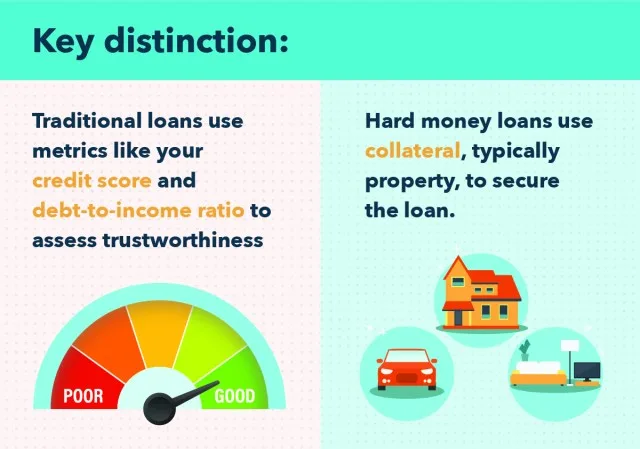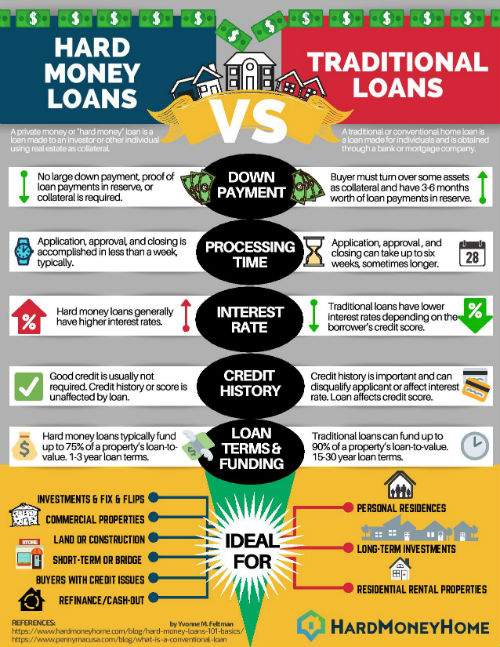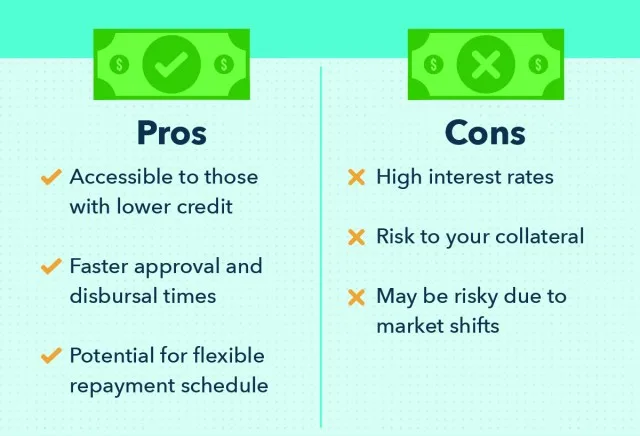In the realm of borrowing, credit scores often play a crucial role in determining one’s eligibility. However, what if you possess a low credit score but have a valuable asset to offer as collateral? This article explores the possibility of obtaining a hard money loan despite a less-than-ideal credit history by leveraging the strength of a substantial asset. By examining the dynamics of hard money loans and their reliance on collateral, this article aims to shed light on the potential options available to individuals looking for financing solutions.
Overview of Hard Money Loans
Definition of hard money loans
Hard money loans are short-term loans that are typically funded by private individuals or companies rather than traditional financial institutions. These loans are secured by the borrower’s real estate assets and are commonly used by real estate investors or individuals who need fast financing and may not qualify for a conventional bank loan.
How hard money loans work
Hard money loans differ from traditional loans in several ways. First, they prioritize the value of the underlying asset rather than the borrower’s creditworthiness. The loan amount is determined by the property’s value, usually referred to as the loan-to-value ratio (LTV). These loans are typically shorter in duration, often lasting from a few months to a few years. Additionally, hard money loans tend to have higher interest rates and fees due to the increased risk involved.
Benefits and drawbacks of hard money loans
One significant advantage of hard money loans is their accessibility to individuals with low credit scores. Unlike traditional lenders, hard money lenders are primarily concerned with the value of the collateral rather than the borrower’s credit history. This allows borrowers with low credit scores to obtain financing that would otherwise be unattainable.
However, hard money loans also come with drawbacks. The higher interest rates and fees associated with these loans can significantly increase the overall cost of borrowing. Additionally, if the borrower fails to meet the repayment terms, the lender has the right to foreclose on the collateral property.
Importance of Credit Score in Loan Approval
Explanation of credit score
A credit score is a three-digit number that summarizes an individual’s credit history and represents their creditworthiness. It reflects how responsible an individual has been in managing their debts and financial obligations. Credit scores are typically calculated based on payment history, credit utilization ratio, length of credit history, types of credit used, and new credit applications.
How credit score affects loan approval
Credit scores play a crucial role in the loan approval process. Lenders use credit scores to assess the risk of lending to an individual. A higher credit score indicates a lower risk borrower, while a lower credit score suggests a higher risk borrower. Therefore, individuals with higher credit scores are more likely to get approved for loans and receive better interest rates and terms.
Why low credit scores are generally a barrier
Low credit scores can be a significant barrier to obtaining traditional loans, as lenders perceive individuals with low credit scores as higher risk borrowers. Lenders worry that individuals with low credit scores may struggle to make timely payments or default on their loans. As a result, most traditional lenders are reluctant to lend to individuals with low credit scores, leaving them with limited loan options.

Understanding Collateral in Loan Applications
Definition of collateral
Collateral refers to an asset that a borrower pledges to the lender as security for a loan. In the case of hard money loans, collateral typically involves real estate properties, such as residential or commercial buildings. By providing collateral, borrowers reduce the risk for lenders since they have an asset to recover in the event of default.
Types of assets that can be used as collateral
In addition to real estate properties, other types of assets can be used as collateral for hard money loans. These assets may include vehicles, jewelry, art, or other valuable possessions. However, it’s essential to note that the value and marketability of the collateral play a crucial role in determining loan approval and terms.
Importance of collateral in loan approval
Collateral is a critical factor in hard money loan approval, particularly for individuals with low credit scores. The value of the collateral property provides security to the lender, mitigating the risk associated with lending to borrowers with less desirable credit histories. The collateral’s value also determines the maximum loan amount that can be granted, as lenders generally offer loans up to a specific percentage of the collateral’s appraised value.
Factors Considered in Hard Money Loan Applications
Loan-to-value ratio
The loan-to-value (LTV) ratio is a significant factor considered by hard money lenders when evaluating loan applications. This ratio compares the loan amount requested to the appraised value of the collateral property. Most hard money lenders offer loans with an LTV ratio ranging from 50% to 70%. A lower LTV ratio indicates reduced risk for lenders, increasing the likelihood of loan approval.
Loan terms and interest rates
Hard money lenders also consider the loan terms and interest rates when evaluating loan applications. These terms may include the length of the loan, repayment schedule, and the frequency of interest payments. Because hard money loans are riskier for lenders, borrowers can expect higher interest rates compared to traditional loans. The specific terms and interest rates offered can vary based on the lender’s criteria, the borrower’s financial situation, and the value of the collateral.
Borrower’s experience and exit strategy
Hard money lenders often assess the borrower’s experience and exit strategy when evaluating loan applications. Experienced real estate investors or borrowers with a solid plan to sell or refinance the property upon completion of a project are more likely to receive loan approval. Lenders want assurance that the borrower has the necessary expertise and a viable plan to repay the loan in full.

Exploring Hard Money Lenders’ Criteria
Credit score requirements
While hard money lenders are more flexible in their credit score requirements compared to traditional lenders, some minimum criteria may still exist. Although the specific requirements vary among individual lenders, borrowers with very low credit scores may face more significant challenges in obtaining approval. However, lenders’ emphasis on collateral value often outweighs credit score limitations, making hard money loans a viable option for individuals with low credit scores.
Role of collateral in loan approval
As previously mentioned, collateral plays a significant role in hard money loan approval. The value and marketability of the collateral property heavily influence the loan amount, interest rates, and terms offered by hard money lenders. Even if a borrower has a low credit score, a strong collateral asset can compensate for the perceived credit risk, increasing the chances of loan approval.
Other criteria for evaluation
In addition to credit score and collateral, hard money lenders consider various other criteria when evaluating loan applications. These may include the borrower’s income, cash flow, debt-to-income ratio, and financial stability. While these factors are secondary to credit score and collateral, they further assist in assessing the borrower’s ability to repay the loan.
Can You Get a Hard Money Loan with a Low Credit Score?
Impact of low credit score on loan approval
While low credit scores are generally a barrier to obtaining traditional loans, they have less impact on hard money loan approval. Hard money lenders are primarily concerned with the value and marketability of the collateral, making them a suitable option for individuals with low credit scores. However, it’s essential to note that while credit scores may have less significance, borrowers may still face higher interest rates and fees due to perceived credit risk.
Advantages of strong asset collateral
Having a strong collateral asset provides significant advantages when applying for a hard money loan with a low credit score. The value of the collateral can compensate for the borrower’s credit history, increasing the chances of loan approval. Furthermore, a strong asset collateral may lead to lower interest rates and fees, as the lender perceives less risk in the transaction.
Compensating factors for low credit scores
In some cases, borrowers with low credit scores may have compensating factors that improve their chances of receiving approval for a hard money loan. These factors may include a stable income, a substantial down payment, history of successful real estate investments, or a well-thought-out exit strategy. Demonstrating these factors can help alleviate concerns about creditworthiness and enhance the overall loan application.

Benefits of Using a Strong Asset as Collateral
Increased chances of loan approval
Using a strong asset as collateral significantly increases the chances of loan approval. Hard money lenders prioritize the value and marketability of the collateral over credit scores, making strong collateral assets an attractive option for individuals with low credit scores. By providing valuable collateral, borrowers demonstrate their commitment to the loan and provide security for the lender.
Lower interest rates and fees
Strong collateral assets can also result in lower interest rates and fees on hard money loans. Lenders perceive less risk in lending to borrowers with valuable collateral, leading them to offer more favorable terms compared to those with weaker collateral or no collateral at all. This can provide significant cost savings over the duration of the loan.
Flexibility in loan terms
Having a strong asset as collateral can also provide borrowers with increased flexibility in loan terms. Lenders may be more willing to negotiate loan terms, repayment schedules, or interest rates when valuable collateral is involved. This flexibility allows borrowers to find a loan structure that aligns with their financial needs and goals.
Steps to Take When Applying for a Hard Money Loan
Researching and selecting reliable hard money lenders
The first step in applying for a hard money loan is to research and select reliable hard money lenders. It is crucial to find lenders with a track record of transparency, reliability, and fair lending practices. Reading reviews, seeking recommendations from industry professionals, and comparing loan terms from different lenders can help identify the most reputable options.
Gathering documentation and preparing financial information
Once potential lenders have been identified, borrowers should gather the necessary documentation and prepare their financial information. This typically includes personal identification documents, proof of income or assets, property details, credit reports, and any other relevant financial records. Having all the required documents organized and readily available can expedite the loan application process.
Negotiating loan terms and conditions
After selecting a preferred hard money lender, borrowers should negotiate loan terms and conditions that align with their needs. This may involve discussing the loan amount, interest rates, repayment schedule, fees, and any additional requirements specified by the lender. Carefully reviewing the terms and seeking clarification on any unclear aspects is essential to ensure a comprehensive understanding of the loan agreement.

Alternatives to Hard Money Loans for Low Credit Scores
Exploring government-backed loan programs
Individuals with low credit scores may consider exploring government-backed loan programs as an alternative to hard money loans. These programs, such as FHA (Federal Housing Administration) loans or VA (Veterans Affairs) loans, typically have more lenient credit score requirements and offer lower down payment options. However, eligibility criteria and program specifics should be thoroughly researched to determine if these options are suitable.
Seeking out private lenders
Private lenders, outside of the traditional banking system, can also be an alternative for individuals with low credit scores. While private lenders may still consider credit scores, they often have more flexibility in their lending criteria compared to traditional lenders. Researching and contacting private lenders to discuss loan options can provide greater possibilities for obtaining financing with a low credit score.
Collaborating with a co-signer
A co-signer with a strong credit history can also be a viable alternative for individuals with low credit scores. When a co-signer is involved, their creditworthiness is considered in the loan application process, increasing the chances of approval. It’s crucial for both parties to have a clear understanding of the responsibilities and potential risks associated with co-signing a loan.
Risks and Considerations for Borrowers with Low Credit Scores
Higher interest rates and fees
Borrowers with low credit scores should be aware that hard money loans typically come with higher interest rates and fees. Since these loans involve higher risk for lenders, they compensate for the perceived credit risk through higher costs. Borrowers should carefully evaluate the overall cost of borrowing and consider whether it aligns with their financial capabilities and objectives.
Potential impact on credit score
While hard money loans are based primarily on collateral rather than credit scores, borrowers should still consider the potential impact on their credit history. Failure to meet the loan obligations and defaulting on the loan can negatively affect credit scores. Responsible repayment and diligent management of the loan can help minimize potential negative impacts on credit standing.
Choosing the right loan option
Individuals with low credit scores should carefully assess their financial situation and consider whether a hard money loan is the right option for their needs. Evaluating the potential risks, costs, and benefits is crucial in making an informed decision. Exploring alternative loan options and seeking professional advice can help determine the most suitable course of action.
In conclusion, obtaining a hard money loan with a low credit score is possible, especially when a strong asset serves as collateral. Hard money lenders primarily prioritize the value of the collateral over credit scores, increasing the chances of loan approval. However, borrowers should carefully consider the risks, costs, and alternatives before deciding on the best financing option for their specific circumstances.




